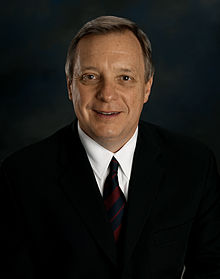An Illinois Senator is saying that the US-Mexico-Canada trade agreement has a provision tucked away that will help fleece Americans at the drug counter. Democratic Illinois Senator Dick Durbin spoke on the Senate floor yesterday highlighting a provision that allegedly cements monopoly protections for pharmaceutical corporations by blocking generic drug competition with name-brand medications. “Often big pharma charges as much as it can get away with by manipulating our drug patent and exclusivity rules for competition. Drugs known as biologics make up 2% of all prescriptions sold but they account for 37% of the cost of prescription drugs, very expensive drugs,” Durbin said.
According to the provision, the USMCA or NAFTA 2.0 as it is now being called, would grant a 10-year minimum exclusivity to biologic drugs, or drugs produced from living organisms like Humira, Rituxan, and Remicade. The exclusive provision would mean that no generic competitor could produce a similar drug and be approved by the FDA for a decade. “Those three biologics have been on the market for more than 17 years and yet they are among the Top 7 highest-grossing drugs in America due to the fortress of monopoly protections that pharma has created. No one can compete with them. They own the market. They set the price. It means that a cheaper, generic competitor cannot be approved by the FDA for more than 10 years while the brand-name company is free to charge whatever they want. Do you wonder why prices are so high? There’s no competition.”
The process by which drug companies file the multiple patents to forestall generic competition, called evergreening, is another piece of language in the bill through the biologics protections. Durbin has introduced a counter provision to reduce the exclusivity period to 7 years. Durbin wonders why the provision is a part of the USMCA trade deal: “We can all agree that prescription drug prices are too high, but why are we putting this provision into a trade agreement? It’s a sweetheart deal for pharma so they can charge higher prices not just in the U.S. but in Mexico and Canada. This trade deal provision allows access for drug companies to obtain secondary patents that delay generic drug competition and keep prices high. So when my farmers come to me and ask ‘Why aren’t you for NAFTA?’ I say to them that if it were just about farmers, it would be a pretty easy call; but it’s about American families, Canadian familes, and even Mexican families paying higher prices for prescription drugs because of a trade agreement that the President wants us to approve. We should be working to bring lower cost products to market sooner and not allow pharma to sneak a payday into a trade package at the expense of American families.”
NAFTA 2.0 is currently awaiting votes in both the House and Senate.




